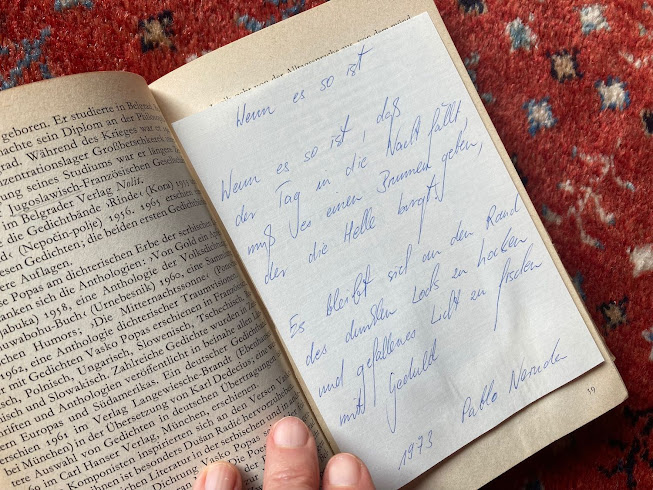Surprises: Opening an old Taschenbuch
Moving books into another bookcase, I come across this:
My handwriting – a surprise from such a long time ago – so lange her. The paper is yellowed and thinned. It feels as if meeting my younger self. I wonder: Really, I did this? Touching the note, I vaguely remember copying it. Other newspaper clips of poems are hidden in the book as well, as bookmarks. Keeping poetry close to me. As consolation, as companion. This poem by Pablo Neruda, written in 1973 shortly before his death, finds me just as I am turning twenty later that same year. The encouragement to sit with and in darkness makes immense sense to me. I know despair. My childhood and my twenties are filled with it. But looking for the light is my lifelong path and work, even back then. This poem promises light if we are patient: fallen light – gefallenes Licht...
Wenn es so ist, dass
der Tag in die Nacht fällt,
muss es einen Brunnen geben,
der die Helle birgt.
Es bleibt sich an den Rand
des dunklen Lochs zu hocken
und gefallenes Licht zu fischen
mit Geduld.
This is the book
Lyric and Essay
sonderreihe dtv 1969
In 1966/67, twenty-one authors from eleven countries (Germany, Poland, Czechoslovakia, Austria, Italy, France, United States, Russia, etc.), each bring one of their poems to the Literarisches Colloquium in Berlin (https://lcb.de/). In each chapter of this book, a writer is discussing his approach, context, meaning, as well as introducing newer work. They are talking across the divide of East and West. A harsh reality back then with the existing Iron Curtain between communist countries and the so-called free world. Reading the book when fifteen, I am already interested in the difficult art form of translating poetry, bridging cultures, social contexts. And I note of course that no women poets are invited. In this regard too, the world has been changing in the past 57 years… slowly...
The original Spanish:
Si cada día cae
dentro de cada noche
hay un pozo
donde la claridad está encerrada.
Hay que sentarse a la orilla
del pozo de la sombra
y pescar luz caída
con paciencia.
Pablo Neruda, from his collection El Mar y las Campanas
English translation by William O’Daly:
If each day falls
inside each night
there exists a well
where clarity is imprisoned.
We need to sit on the rim
of the well of darkness
and fish for fallen light
with patience.
The Sea And The Bells (ed. Copper Canyon Press, 2002)
Pablo Neruda (1904 – 1973) was a Chilean poet, diplomat and politician, who won the Nobel Prize in Literature in 1971. He is considered the national poet of Chile, and his works have been popular and influential worldwide. Having been a communist in Chile, his work was after the war extensively translated, published and cherished in East Germany. (Some other day more about my uncle, an editor with the prestigious S. Fischer Verlag in East Germany, and how our family was divided by the Iron Curtain.)





Comments
I got some version of the message about sitting on the rim of the well of darkness when I was 20. I was really into taking LSD at that age, and my understanding of darkness was mixed up with psychedelics, with finding some contact in the world, and with praise from peers about how explorative I was. In the past month I have returned to that darkness. This poem reminds me that sitting on the rim of the well is not the same as the desperation with which I have sought superiority/recognition/connection. Patience, fishing. And wonderful that I have no idea what he means when he says that it is “donde la claridad esta encerrada.”
Yeah, i wonder about that word "encerrada." In the German translation the word used is more like "where the light is held." I would use the word embedded or embraced. The image then becomes the dark well which embraces or holds the light that has fallen into it, like day into night. The German word is old and complex, it hits the spot of this paradox which is inherent in life's mysteries.
I was going to write about this. The translation of "imprisoned" does not work for me. You will discover this meaning for yourself as you are living into the next phases of your life :) For me it is a T'ai Chi poem.